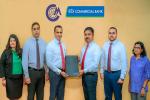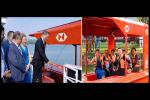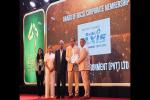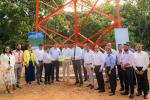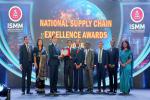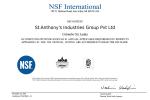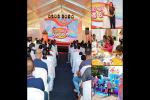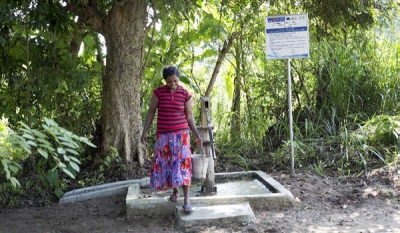“2 years ago, I was admitted to the Dickoya Base Hospital and I had such a bad experience.
The toilets were inaccessible by wheelchairs, there was no water and you could smell the toilets from the next ward.”
The four-year long project, ‘Assisting Communities in Creating Environmental and Nutritional Development’ funded by the European Union and jointly implemented by ADRA UK together with ADRA Sri Lanka, and OXFAM in association with Maskeliya MOH (Office of the Medical Officer of Health) and the Department of National Community Water Supply, government institutions and line ministries, focused on the renovation of latrines and water filtration units in the Dickoya Base Hospital in the Nuwaraeliya district, which serves approximately 500 patients per day.
The renovated toilets included a number of child friendly toilets and disabled accessible toilets in the Hospital’s old wing and other areas including the Physiotherapy Ward, Stroke Unit, Paediatric Ward and Male and Female Wards.
The project's main objective is to ensure that the vulnerable rural and estate communities have increased access to water, sanitation, hygiene and nutrition facilities, improved personal hygiene and sanitation practices, and community driven services managed in collaboration with strengthened public authorities.
The project is engaged in improving health, nutrition, hygiene and sanitation among Sri Lanka’s rural and estate communities in the Uva and Central Provinces – including Nuwaraeliya, Monaragala and Matale Districts.
A total of 300,000 families are set to benefit from this project that will contribute towards improving their quality of life.
The project also conducted training on Health and Hygiene for the MOH staff in Maskeliya and Bogawanthalawa, in addition to more focused training towards Public Health Midwives and Public Health Inspectors in these areas.
Rasamma is no longer worried about using sanitation facilities when visiting the hospital.
She said, “When I fell ill again, I was worried I will experience the same, but I was very pleasantly surprised.
For the first time, I could take my wheelchair inside the toilet and use all the facilities with minimum help from my caretaker.
They had even installed a sanitary pad disposal unit, which is wonderful.
I am no longer worried to come to this hospital. I find this very comforting.”
Another important feature of this project is its unique approach of ‘water as a connector’ to unite and engage the community, estate management, and government officials at the provincial, district and local levels to contribute towards the implementation of the Government’s Rural Water and Sanitation Supply (RWSS) Policy.
Through this approach, the project has been able to strengthen the governance in community structures and has demonstrated that if the government, communities and other partners can work together on WASH, they can also work on other pressing issues in the area.
Elaborating on ADRA’s contribution and work in relation to the project, Prabhook Bandaratilleke, Programs Director, ADRA Sri Lanka said, “This is our first working experience with the EU.
The commitment demonstrated by the EU Delegation in Sri Lanka towards ensuring sustainable development is admirable.
They spearhead several initiatives such as national level steering committees and coordination with relevant Ministries that has impacted our work in the field positively.
Development work is challenging and can be faced only through real partnerships and we are fortunate to have received the opportunity to work with the EU.”
The project has also been a catalyst and lifeline for many individuals such as A. D. Imanlatha, a widow and her son, Isuru Pathum, a quadriplegic from birth.
Her son needs to be carried to and from the bed for his basic needs.
Even though well-wishers have supported the family with a provision of a wheelchair, the house nor the temporary toilet were wheelchair accessible.
Based on the recommendation of the leaders of the Health and Nutrition Committee which is a Community Based Organisation leading the health and nutrition components of the project.
The project constructed a disable-friendly toilet together with a water supply system that uses the hand pump to manually pump water to an overhead tank so the toilet will have running water.
Her son now has access to water and his barriers to using sanitation facilities no longer exist.
Another aspect of the project is the strengthening of existing government services by building the capacity of the staff of the MOH.
These trainings are focused on attitude, skills and knowledge development.
A notable training, titled ‘Health sector disaster management for public health staff’, which was designed by the disaster preparedness and response division of the Ministry of Health was conducted for the MOH staff of Maskeliya and Bogawanthalawa.
E.G.N. Chanika, a Public Health Midwife from the Bogawantalawa MOH who was able to develop her capacity through this project said, “I have worked as a Public Health Midwife for the past 15 years.
However, this was the first training I have attended. I greatly appreciate the practical aspect of this training.
Today I learned of things I would have done better have I had attended this training before this day.”
Photo Captions
1.) Community latrine before intervention
2.) Community latrine after intervention
3.) Renovated latrine at the Dickoya Base Hospital
4.) Renovated Hand Pump at A.D Imanlatha's home
